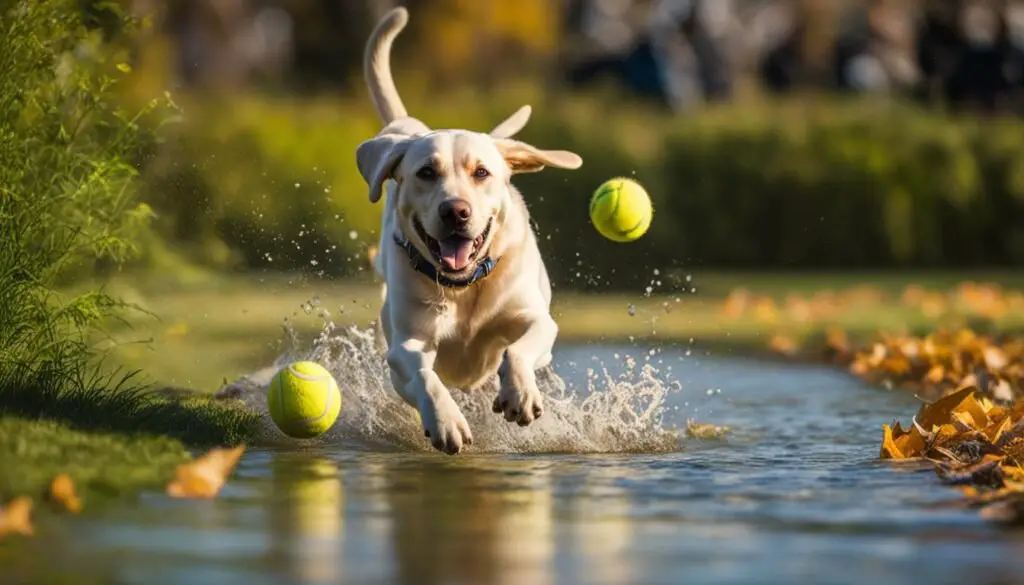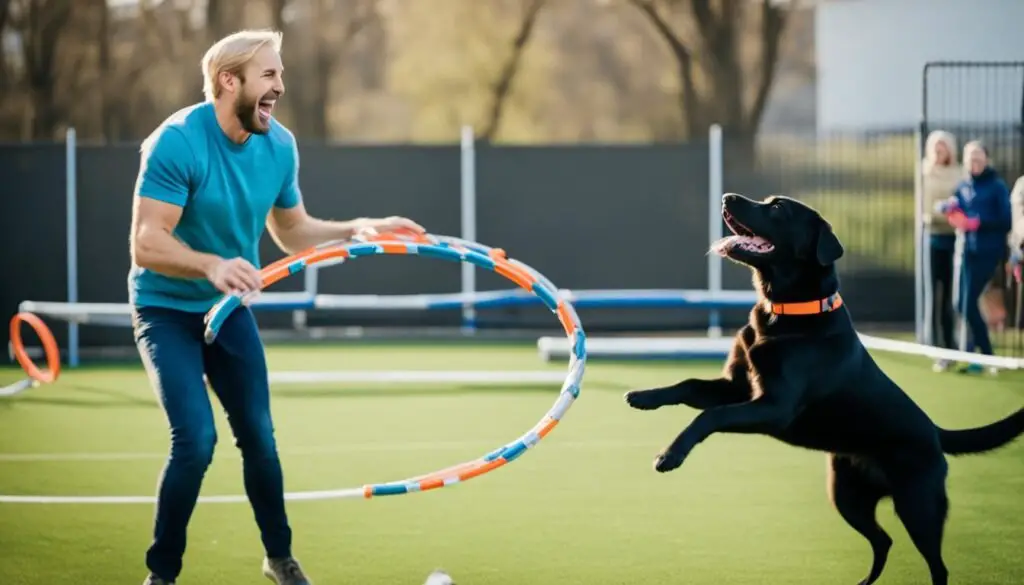Welcome to the world of Labradors, where every stage of their life is filled with excitement, joy, and unique challenges. Have you ever wondered what makes Labradors such amazing companions? How do their behaviors, health needs, and training requirements change as they grow older? And what role does food and fun play in their overall well-being? Today, we’re embarking on a journey through the various life stages of Labradors, exploring their definitions, behavioral characteristics, health considerations, training needs, dietary requirements, and the importance of play and fun in their lives. Get ready to unlock the secrets of Labrador care and discover everything you need to know to provide the best possible life for your furry friend.
Thank you for reading this post, don't forget to subscribe!Key Takeaways:
- Labradors go through different life stages, each with its own unique characteristics and requirements.
- Understanding Labrador behavior is crucial for effective training and establishing a strong bond with your furry companion.
- Proper healthcare and regular check-ups are essential for maintaining your Labrador’s health and well-being throughout their life.
- Training Labradors at an early age helps shape their behavior and ensures they grow up to be well-behaved and obedient.
- Choosing the right food and providing a balanced diet is vital for supporting your Labrador’s growth, energy levels, and overall health.
Introduction to Labradors: A Comprehensive Overview
Labradors are one of the most beloved and popular dog breeds worldwide. Known for their friendly and affectionate nature, Labradors make excellent family pets and trusted companions. But how much do you know about Labradors? In this section, we will provide a comprehensive overview of Labradors, delving into their history, breed characteristics, and the fascinating origins of their name.
What is the English of Labrador?
The English translation of “Labrador” refers to the region of Labrador in Eastern Canada, where the breed originated. Labradors were historically used by fishermen in this region to assist in retrieving fish and hauling nets. Due to their outstanding swimming abilities, intelligence, and gentle disposition, Labradors quickly gained recognition as a versatile and reliable working breed.
Labradors, commonly referred to as “Labs,” are renowned for their exceptional retrieving skills, making them the preferred choice for search and rescue missions, therapy work, and various canine sports. Their intelligence, loyalty, and adaptability have further contributed to their wide-ranging popularity across different settings and roles.
Why is a Labrador called a Labrador?
The name “Labrador” is derived from the Labrador Sea, which lies adjacent to the Labrador region in Canada. The breed’s association with this region led to its name. The Labrador Retriever, as it is formally known, perfectly embodies the characteristics necessary for its original purpose as a versatile retriever. These traits include a strong instinct to retrieve, a water-resistant coat, a sturdy build, and an affable temperament.
| Labrador | Characteristics |
|---|---|
| Origin | Labrador region of Eastern Canada |
| Purpose | Retrieval of fish and hauling nets for fishermen |
| Temperament | Friendly, loyal, and intelligent |
| Physical Features | Strong, athletic build with a water-resistant coat |
Labradors have come a long way from their humble origins as working dogs in Labrador. Today, they are cherished family members and a source of joy and companionship for countless households around the world.
Now that we’ve explored the English translation of Labrador and the reasons behind its name, we can delve deeper into the various life stages and characteristics of Labradors. In the upcoming sections, we will discuss their infancy and puppyhood, adolescence, adulthood, and senior years. By understanding and appreciating the unique needs of Labradors at each stage, you will be better equipped to provide optimal care, training, and companionship throughout your Labrador’s journey.
Infancy and Puppyhood: The Formative Years
In the formative years of a Labrador’s life, infancy and puppyhood play a crucial role in shaping their development and behavior. This stage represents a time of rapid growth, exploration, and learning, as Labrador puppies embark on their journey towards becoming well-rounded adult dogs.
Characteristics of Infant Labrador Puppies
Infant Labrador puppies exhibit unique characteristics that set them apart from their adult counterparts. These adorable bundles of fur are known for their playful and curious nature, boundless energy, and eagerness to explore the world around them. With their soft, fuzzy coats and innocent expressions, it’s hard to resist their charm.

During infancy, Labradors rely heavily on their sense of smell, as they use their tiny noses to investigate and familiarize themselves with their surroundings. They may be seen sniffing objects, people, and other animals, taking in various scents that help them create a mental map of their environment.
In terms of physical development, infant Labrador puppies are still gaining strength and coordination. Their movements may be unsteady at times, but with each passing day, they become more agile and capable of exploring their surroundings with increased confidence.
It’s important to note that individual Labrador puppies may display variations in their behavior and temperament even during infancy. While some may be outgoing and adventurous, others may be more reserved and cautious. These differences contribute to the unique personality and character traits that develop as Labradors grow.
Training Basics for Labrador Puppies
Proper training during the puppyhood stage is crucial for setting a solid foundation for a Labrador’s future behavior and development. Here are some essential training basics for Labrador puppies:
- Socialization: Introduce your Labrador puppy to various people, animals, and environments to help them become well-adjusted and confident in different situations.
- Potty Training: Establish a consistent routine and positive reinforcement to teach your Labrador puppy where to relieve themselves.
- Basic Commands: Teach your puppy commands such as “sit,” “stay,” and “come.” Use positive reinforcement techniques, such as treats and praise, to encourage learning.
- Leash Training: Begin introducing your puppy to leash walking in a safe and controlled environment. Gradually increase the duration and complexity of walks as they become more comfortable.
- Bite Inhibition: Teach your puppy appropriate chewing behavior and discourage biting or nipping through gentle redirection and reinforcing positive play.
Consistency, patience, and positive reinforcement are key when training Labrador puppies. It’s important to remember that each puppy is unique, and training progress may vary. Tailor the training approach to suit your Labrador’s individual needs and ensure their training sessions are fun and engaging.
Adolescence: Navigating the Teenage Phase
In this section, we will explore the adolescent stage of Labradors, which is often considered the teenage phase. Adolescence in Labradors is a transformative period where they undergo significant physical and behavioral changes. Just like human teenagers, Labradors may exhibit challenging behaviors that can leave pet owners feeling frustrated. However, understanding the typical Labrador behavior during adolescence and implementing effective training strategies can help you navigate this phase with success.
Typical Labrador Behavior during Adolescence
During adolescence, Labradors may display a range of behaviors that can test your patience. The surge of hormones can lead to increased energy levels and a desire to explore their surroundings. It is common for adolescent Labradors to become more independent, stubborn, and prone to testing boundaries. They may also show signs of restlessness, disobedience, and selective hearing. It’s important to remember that these behaviors are a normal part of their development and not a reflection of your ability as a pet owner.
Adolescent Labradors may also experience mood swings, becoming suddenly excited or irritable. They may engage in rough play or exhibit signs of mounting other dogs or objects as they begin to explore their sexuality. It’s crucial to remain patient, consistent, and understanding during this phase, providing appropriate outlets for their energy and addressing any behavioral issues promptly.
Adolescent Labrador Training Strategies
Training strategies for adolescent Labradors should focus on positive reinforcement, consistency, and patience. Here are some effective training strategies to help you navigate this challenging phase:
- Set clear boundaries and consistent rules: Establishing clear boundaries and enforcing consistent rules will help your adolescent Labrador understand what is expected of them. Be firm, yet gentle, in your training approach.
- Use positive reinforcement: Rewarding desirable behaviors with treats, praise, and affection will reinforce positive behavior and motivate your Labrador to repeat those actions.
- Provide mental stimulation and physical exercise: Labradors have a lot of energy, and providing them with regular mental stimulation and physical exercise can help channel that energy in productive ways. Engage in activities such as puzzle toys, obedience training, and long walks or runs.
- Enroll in obedience classes: Professional obedience classes can provide structured training environments with expert guidance. These classes can help improve your Labrador’s socialization skills and reinforce obedience commands.
- Redirect unwanted behavior: Instead of punishing your Labrador for unwanted behaviors, redirect their attention to more appropriate activities or provide them with an alternative behavior to perform.
With patience, consistency, and understanding, you can successfully navigate the teenage phase of Labrador adolescence. Remember, this phase is temporary, and with the right training strategies, your Labrador will soon grow into a well-behaved adult.
Now that we have explored the various life stages of Labradors, it’s time to delve deeper into some key aspects of Labrador care. Understanding their definition, behavior, health, food, and the importance of play and fun in their lives is crucial for providing them with the best care and ensuring their overall well-being.
Let’s start with the definition of Labradors. Labradors are a popular breed of retrievers known for their friendly and outgoing nature. They are highly intelligent, trainable, and make excellent companions for individuals and families alike.
When it comes to behavior, Labradors are known for their loyalty, affection, and enthusiasm. They thrive on human interaction and are often eager to please. Labradors are generally friendly with people and other animals, which makes them excellent family pets.
Labrador health is a top priority for every pet parent. Regular veterinary check-ups, vaccinations, and preventative care are essential for maintaining their well-being. Labradors are generally a healthy breed, but they can be prone to certain health conditions such as hip dysplasia, obesity, and certain genetic disorders.

Proper nutrition is vital for the health and vitality of Labradors. A well-balanced diet that provides all the essential nutrients is necessary to support their growth, development, and overall health. It is important to choose high-quality dog food that meets their specific nutritional needs.
Labradors are energetic and playful by nature. Regular exercise and playtime are crucial for their physical and mental stimulation. Engaging in activities like fetch, swimming, and interactive play not only keeps them fit but also strengthens the bond between you and your furry friend.
Play and fun are integral parts of a Labrador’s life. Whether it’s chasing a ball, playing tug-of-war, or participating in dog sports, incorporating activities that bring joy to their lives is essential for their happiness and overall well-being.
By understanding Labrador definition, behavior, health, food, play, and fun, you can provide the best care and environment for your Labrador. Their unique traits, combined with your love and dedication, will ensure a fulfilling and enriching life for your furry companion.
Adult Labradors: Prime Years of Health and Maturity
In this section, we will focus on adult Labradors, who are basking in the prime years of their health and maturity. These graceful and loyal dogs have come a long way from their puppy days and are now ready to embrace the best years of their lives. Let’s delve into what this life stage means for Labradors and explore the optimal training practices that will keep them happy, healthy, and obedient companions.
What Does the Name Labrador Mean in This Life Stage?
Labradors, known for their intelligence and remarkable adaptability, continue to embody their name even in adulthood. Derived from the picturesque Labrador Sea in Canada, these dogs stay true to their heritage by displaying strength, reliability, and an unwavering spirit. In this life stage, Labradors are confident, self-assured, and carry themselves with the grace and poise befitting their name.
Optimal Training Practices for Adult Labradors
Training practices for adult Labradors should focus on reinforcing good behavior, fine-tuning obedience skills, and promoting mental stimulation. Here are some invaluable training tips to ensure your adult Labrador continues to grow and thrive:
- Consistency is key: Stick to a consistent training routine to establish clear boundaries and expectations.
- Reward-based training: Utilize positive reinforcement techniques such as treats, praise, and play to motivate and encourage desired behavior.
- Maintain mental stimulation: Engage your adult Labrador in interactive games, puzzle toys, or advanced training exercises to keep their minds sharp.
- Continue socialization: Adult Labradors benefit from regular social interactions with humans and other dogs to maintain good manners and prevent behavioral issues.
- Exercise for physical and mental well-being: Provide daily exercise to keep your adult Labrador physically fit and mentally stimulated.
By following these optimal training practices, you can ensure that your adult Labrador remains well-behaved, happy, and fully engaged in their prime years of life.
The Senior Labrador: Golden Years and Care
In this section, we will discuss the senior stage of Labradors, also known as their golden years. As our furry friends enter their senior years, they require special care and attention to ensure their health and well-being.

Senior Labradors have specific health considerations that need to be addressed. It’s important to monitor their weight, as obesity can lead to various health issues. Providing a balanced diet that meets their nutritional needs is essential for maintaining their overall health.
Adequate exercise is also important for senior Labradors. While their energy levels may decrease, regular physical activity helps keep their joints and muscles healthy, as well as prevents weight gain. Low-impact exercises like short walks or swimming are ideal for senior Labradors.
Regular veterinary check-ups are crucial during this stage of life. Senior Labradors may be prone to age-related conditions such as arthritis or dental issues. Regular examinations, vaccinations, and dental cleanings can help detect and address any potential health problems early.
Mental stimulation is equally important for senior Labradors. Engaging their minds with puzzle toys, obedience training, and interactive play can keep their cognitive abilities sharp and prevent boredom or anxiety.
Lastly, ensure that your senior Labrador has a comfortable and safe living environment. Provide a soft and supportive bed to ease any joint discomfort and ensure that their living space is free from hazards that could cause injuries.
By providing appropriate care and attention to your senior Labrador, you can ensure their comfort and happiness during this stage of life. With proper nutrition, regular exercise, veterinary care, mental stimulation, and a loving environment, your senior Labrador can enjoy their golden years to the fullest.
Nurturing Labrador Health Through Proper Nutrition
Proper nutrition is key to ensuring the overall health and well-being of your Labrador. By understanding the specific food requirements for Labradors at different stages of their life, you can provide them with the best care possible.
Labrador Food Requirements by Age
Different life stages require different nutritional needs, and Labradors are no exception. Here’s a breakdown of their food requirements based on age:
- Puppyhood: During this stage, Labradors need a diet that supports their rapid growth and development. Choose a high-quality puppy food that is rich in protein, vitamins, and minerals to provide them with the necessary nutrients.
- Adulthood: As Labradors reach adulthood, their nutritional needs change. Opt for a balanced diet that includes lean proteins, healthy fats, carbohydrates, and a variety of fruits and vegetables. This will help maintain their weight and provide them with the energy they need for their daily activities.
- Senior Years: Labradors in their senior years may have specific dietary considerations. Look for senior dog food formulas that are specially formulated to support their aging bodies. These formulas typically contain ingredients that promote joint health and support cognitive function.
Remember to consult with your veterinarian to ensure you are meeting your Labrador’s specific nutritional needs based on their age, activity level, and any health conditions they may have.
Labrador Health Tips: Diet and Exercise
In addition to proper nutrition, a healthy diet and regular exercise are crucial for maintaining your Labrador’s overall health. Here are some health tips to keep in mind:
- Diet: Make sure your Labrador’s diet is balanced and includes all the necessary nutrients. Avoid feeding them table scraps or foods that are toxic to dogs, such as chocolate, grapes, and onions. Stick to a consistent feeding schedule to promote healthy digestion.
- Exercise: Labradors are energetic dogs that require regular exercise to keep them physically and mentally stimulated. Aim for daily exercise sessions that include brisk walks, playtime, and interactive activities like fetch. This will help prevent weight gain, promote cardiovascular health, and reduce behavioral issues.
By prioritizing proper nutrition, following a balanced diet suitable for your Labrador’s age, and incorporating regular exercise into their routine, you can promote optimal health and well-being for your furry friend.
Effective Training for Labradors at Any Age
In order to ensure the development and well-being of your Labrador, it is crucial to implement effective training techniques at every stage of their life. Whether you have a playful puppy, an adventurous adolescent, a wise adult, or a gentle senior, training is key to fostering a strong bond and ensuring good behavior in your furry companion.
Labrador training revolves around understanding the core principles of canine behavior and utilizing techniques that are suitable for their age and temperament. By creating a positive and structured training environment, you can help your Labrador thrive and become a well-adjusted member of your family.
To embark on this training journey, consider the following techniques:
- Positive Reinforcement: Use rewards such as treats, praise, and play to reinforce desired behaviors. This approach encourages your Labrador to repeat these behaviors in order to receive positive reinforcements.
- Consistency: Establish a consistent training routine with clear commands and expectations. This helps your Labrador understand what is expected of them and reduces confusion.
- Patience and Persistence: Training takes time and effort. Be patient with your Labrador and consistently reinforce desired behaviors. With persistence, they will gradually learn and improve.
- Socialization: Expose your Labrador to various environments, people, and animals to help them develop social skills and become comfortable in different situations. This can prevent behavior issues in the future.
- Exercise and Mental Stimulation: Labradors have high energy levels and require regular exercise and mental stimulation to stay happy and well-behaved. Incorporate activities such as walks, playtime, and puzzle toys into their daily routine.
Remember, training is an ongoing process that requires consistency and time. Be patient and celebrate small victories along the way. With effective training techniques, you can transform your Labrador into a well-behaved and happy companion.

“Training is not a one-time event; it is a lifelong commitment to understanding, guiding, and communicating with your Labrador.”
By implementing these effective training techniques, you can build a strong and positive relationship with your Labrador, navigate behavioral challenges, and create a harmonious living environment. Embrace the training journey with your furry friend and watch them flourish at any age!
Play & Fun with Labradors: Keeping Your Dog Happy
Labradors are known for their playful and fun-loving nature. Engaging in play activities is not only enjoyable for them but also essential for their overall well-being. Playtime provides mental stimulation, physical exercise, and strengthens the bond between you and your Labrador. Incorporating games and play activities into their routine is a great way to ensure they stay happy, engaged, and mentally stimulated.
Labrador Games for Fun and Training
“All work and no play makes for a dull Labrador.”
Labradors are highly intelligent dogs that thrive on mental challenges. Incorporating games into their playtime not only provides entertainment but also serves as an effective training tool. Here are some Labrador games that you can enjoy together:
- Fetch: Labradors love retrieving objects, so playing fetch can be a rewarding game for them. Use a ball or a favorite toy and teach them to bring it back to you. This game not only expends their physical energy but also engages their problem-solving skills.
- Tug of War: This game allows you to interact and bond with your Labrador while satisfying their natural instinct to pull and tug. It’s important to establish rules and boundaries to prevent any aggressive behavior.
- Hide and Seek: Hide and Seek is a fun game that involves hiding treats or toys around your house or yard for your Labrador to find. This game not only exercises their sense of smell and problem-solving abilities but also keeps them mentally stimulated.
- Interactive Toys: There are many interactive toys available for Labradors that provide mental stimulation and entertainment. Puzzle toys, treat-dispensing toys, and Kong toys are great options to keep your Labrador engaged and mentally sharp.
Labrador Play Activities for Mental Stimulation
“A tired dog is a well-behaved dog.”
Mental stimulation is just as important as physical exercise for Labradors. Engaging them in play activities that challenge their minds can prevent boredom and unwanted behaviors. Here are some ideas for play activities that provide mental stimulation:
- Obedience Training: Training sessions not only teach your Labrador essential commands but also provide mental stimulation. Teaching them new tricks and reinforcing existing commands keeps their minds active and engaged.
- Scent Work: Labradors have a keen sense of smell, making scent work an excellent activity for mental stimulation. Hide treats or toys and encourage your Labrador to find them using their nose. This activity taps into their natural instincts and gives them a sense of purpose.
- Agility Training: Set up an agility course in your backyard or participate in agility classes with your Labrador. This activity challenges their problem-solving skills, coordination, and boosts their confidence.
- Water Activities: Many Labradors love swimming and playing in water. Take them to a pet-friendly beach, lake, or pool for a refreshing and mentally stimulating water play session.
Remember to tailor the play activities to your Labrador’s individual preferences, age, and physical capability. Always prioritize their safety and offer positive reinforcement during playtime. With the right combination of fun games and mentally stimulating activities, you can provide a fulfilling and enriching play experience for your Labrador.
Conclusion: Embracing Every Stage of Your Labrador’s Journey
Throughout this article, we have explored the various life stages of Labradors, from infancy and puppyhood to adolescence, adulthood, and the senior years. We have discovered the unique characteristics, behavioral patterns, and training needs of Labradors at each stage. Now, it’s time to wrap up our journey by emphasizing the importance of embracing every stage of your Labrador’s development and providing the best possible care.
Labradors go through remarkable transformations as they grow, and each stage brings its own challenges and joys. From the curious and energetic puppy to the wise and dignified senior, Labradors offer endless love and companionship throughout their lives. By understanding and appreciating their changing needs, we can ensure their well-being and happiness.
As responsible Labrador owners, it is our duty to provide the necessary care, training, and love at every stage. From early socialization and basic obedience training in puppyhood to addressing behavioral changes in adolescence and maintaining their health in the senior years, our commitment to their well-being remains constant.
So, whether you’re a new Labrador parent or a seasoned owner, remember to embrace every stage of your Labrador’s journey. Cherish the playful moments, be patient during the challenging times, and adapt your care to their evolving needs. By doing so, you’ll create a lifelong bond and ensure a fulfilling life for your beloved Labrador companion.



